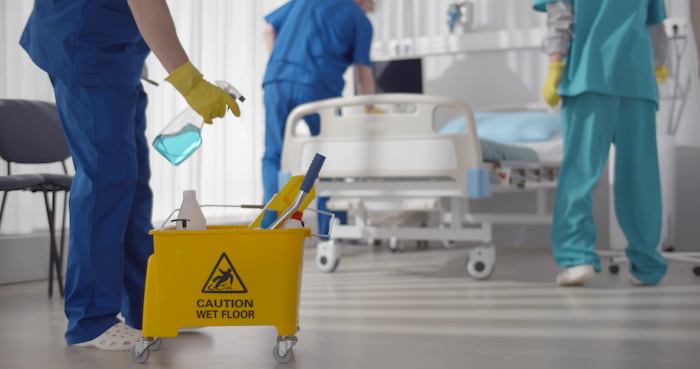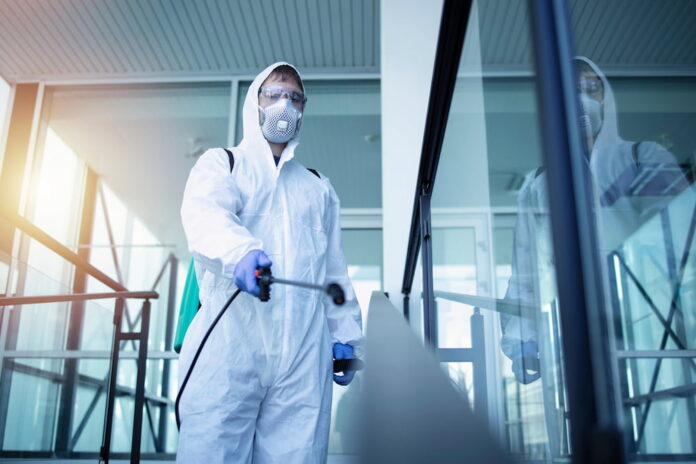Germs from one person can easily be transferred to another, even without direct contact. These can be transmitted by touching an object or surface that isn’t thoroughly cleaned and sanitized. It’s vital in hospitals and other healthcare settings to properly clean and disinfect to avoid spreading germs, bacteria, and viruses, preventing people from getting sick.
Here are the reasons why it’s essential to disinfect in the healthcare industry:
1. To Prevent The Spread Of Unwanted Bacteria
According to Hygieia-San, one of the most significant factors people look for in a hospital, clinic, or laboratory is its cleanliness, hygiene, and sanitation. A clean and sanitized hospital lobby, clinic reception area, and shared bathroom give an excellent impression to patients—and they’ll feel more comfortable using those areas.
It also makes them feel less anxious about getting infected due to airborne diseases and bacteria from surfaces that may compromise their health. It also follows that if the common area is clean and well-maintained, the rooms and the medical services are excellent too. Hospitals and clinics are businesses. It’s essential to give the patients and customers a superb perception so they’d return if needed.
2. To Keep Surfaces Clean For Other Patients And Health Workers
High-touch surfaces are often touched by people that may be easily contaminated and picked up by others using their hands. These include the light switch, door knob, bed rail, bed frame, tray table, IV pole, and other shared equipment.
These are also surfaces in the bathroom like the faucet, toilet, flush handle, bathroom tissue rolls and dispenser, hand dryer, and sink.
Your hands touch many things throughout the day and risk carrying microorganisms that may enter your body like eating without washing your hands.
That’s why cleaning and disinfecting these high-touch surfaces is essential to prevent these microorganisms from spreading, especially after a patient is discharged and another occupies the same room. It’s not only for the patient’s safety but also for the medical practitioners and other workers.
3. To Avoid Transmission Of Infectious Diseases
After every use, medical supplies such as face masks, oxygen masks, syringes, gloves, and bandages must be disposed of. These must be appropriately segregated to avoid contamination and the spread of diseases.
Medical equipment and supplies like stethoscopes, digital thermometers, blood pressure monitors, patient monitors, EKG/ECG machines, defibrillators, X-ray machines, and the like should be cleaned, sanitized, and disinfected after each patient’s use to avoid transfer of germs from one person to another.
Proper cleaning and disinfection also ensure the safety of doctors, nurses, and other medical workers. They’d be able to work without worrying too much about their health.
4. To Ensure That Common Areas, Rooms, Equipment, And Supplies Are Bacteria-Free

Cleaning removes dust, dirt, or other impurities from an object, surface, or environment. Usually, you can already tell if a thing or surface is already clean just by looking at it. But you’re still unsure if it’s free of germs because those microorganisms are too tiny for the naked eye to see.
Remember, bacteria can stay up to five months on a dry surface. That’s why it’s essential to disinfect after cleaning and follow the instructions of the disinfecting products to ensure that germs, bacteria, and viruses will be killed.
Also, be mindful of how long the product or chemical should sit on the object, equipment, or surface to kill the bacteria. Doing a deep cleaning and sanitation is better than risking being sick.
5. Important For The Immune System
When people are healthy, they’re less likely to get sick. Their bodies have ways to fight against infection. However, most patients are ill in hospitals and clinics, and their immune system is weak. They’re more vulnerable to bacteria.
It poses a higher chance for them to acquire more diseases and might bring their health at risk.
That’s why it’s vital to keep the hospitals and clinics clean and disinfected to eliminate or at least lessen the chance of getting an unwanted disease. It’ll only not benefit the patients but the people in the workforce as well.
Final Thoughts
People go to hospitals or clinics to seek medical attention and treatment to feel better and healthier. On the contrary, there’s a risk of going to the hospital as you might have exposure to harmful bacteria and diseases.
But you don’t need to worry since this will be prevented if proper cleaning, sanitation, and disinfection are implemented in clinics and hospitals.
You must always be diligent in selecting the healthcare provider you entrust your health to. Consider the ideas mentioned here as you plan and prepare.
Read Also
- How to Drive Growth Through Customer Centricity in HealthcareThe world of healthcare is changing in big ways. Consumers are now stepping up and taking charge of their health journeys. This change is happening now for important reasons. The U.S. health and wellness market is huge, projected to be over $6 trillion in 2025. This growth is fueled by rising out-of-pocket costs and more… Read more: How to Drive Growth Through Customer Centricity in Healthcare
- Maximizing Digital Reach for Podiatry Clinics in Local HealthcareMaximizing Digital Reach for Podiatry Clinics in Local Healthcare As the healthcare industry evolves, mobile marketing becomes indispensable for practitioners. Podiatry clinics, focusing on foot and ankle care, must adapt to digital strategies to engage patients effectively. Implementing tailored SEO practices is crucial for these clinics to thrive in an increasingly competitive market. Digital marketing… Read more: Maximizing Digital Reach for Podiatry Clinics in Local Healthcare
- Leveraging Virtual Medical Assistants to Maximize Operational Efficiency in HealthcareIn the increasingly complex and fast-paced world of healthcare, operational efficiency is critical. Doctors and healthcare administrators are faced with numerous challenges, from managing patient scheduling and medical billing to adhering to stringent regulatory compliance and insurance claims processing. These tasks, while essential, often divert time and resources away from the core mission of providing… Read more: Leveraging Virtual Medical Assistants to Maximize Operational Efficiency in Healthcare
- Optimizing CT Protocols: The Hidden Key to Efficiency and Cost Savings in RadiologyIntroduction: Why CT Protocol Optimization Matters Computed Tomography (CT) is a cornerstone of modern diagnostic imaging, providing critical information across nearly every medical specialty. However, maximizing the value of CT — both clinically and financially — requires more than just advanced hardware. The real secret lies in the optimization of CT protocols. When CT protocols… Read more: Optimizing CT Protocols: The Hidden Key to Efficiency and Cost Savings in Radiology
- Hospital Discharge Accuracy Improves With Daily Advisor InvolvementThe hospital discharge process has a big effect on patient recovery, hospital efficiency, and finances. It requires careful planning and clear communication between team members to make sure patients get the right care when they leave the hospital. Having physician advisors involved at this stage can improve the discharge process by spotting problems that need… Read more: Hospital Discharge Accuracy Improves With Daily Advisor Involvement






